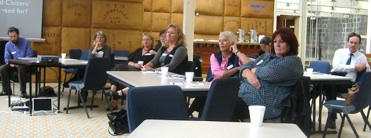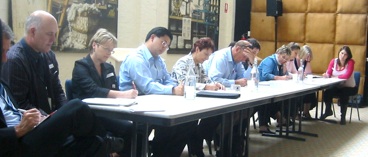 Citizen’s Jury
Citizen’s Jury
The Geelong Community Engagement Community of Practice recently carried out a ‘citizen’s jury on citizen’s juries’. I was asked to present as an ‘expert witness’, a task I accepted with alacrity. I believe the intention to promote dialogue and deliberation on a topic through the technique to be admirable. A group of people hear a variety of opinions about an issue, then engage in dialogue with each other around the issue and finally deliver their deliberations. Highly commendable. Furthermore the other expert witnesses also testified about how those involved in the real life juries they had experienced found the process to be energising and empowering. I though have reservations about their use. My principle concern is that at the core, the process is still exclusive not inclusive. My perception is that while those ‘on the jury’ are empowered and engaged, those not on the jury are in no better or worse a situation than the general population in our current main stream decision making processes. Somebody else is being empowered, somebody else is having the dialogue, somebody else will make the decision, I might as well go and watch telly. We have the technologies to enable large numbers of people engage in hearing quality information, having dialogue with each other across space and time differences, and indicating preferences quite simply and cheaply. Why use a decision making model invented in the 18th Century?
To me, there were two really telling parts in this demonstration. The first was in the moments after the jury had been randomly selected and commenced listening to the first ‘expert witness’. Note the concentration and engagement of those on the jury, compared to those not selected. The second was how by the end of the demonstration, or experiment, all those on the jury were still in the room, but by far the majority of those that had not been selected had left.
Today’s issues need to be discussed and deliberated on by all sectors of society, not just a select few – however selected.

